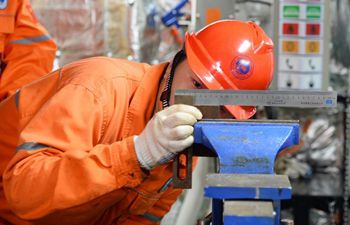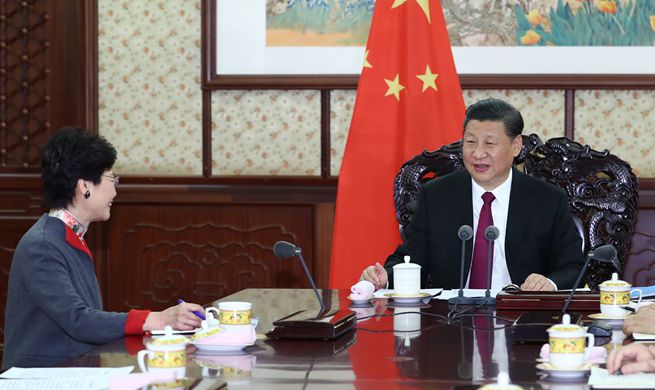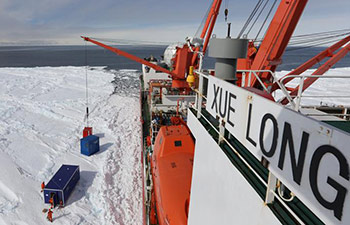by Jon Day
TOKYO, Dec. 16 (Xinhua) -- Japan's economy, the third-largest in the world, has huffed and puffed its way through 2017, mired in the same negative cycles since its asset price bubble's collapse in the early 1990s.
And "Abenomics," while rich in Japanese Prime Minister Shinzo Abe's magniloquence, is still lacking in actual invigoration, experts have said.
At first glance, the world's third-largest economy growing an annualized 2.5 percent in the July-September quarter and beating the preliminary reading of a 1.4 percent expansion, bodes rather well for Japan.
But this comes thanks to a significant upgrade to capital expenditure figures driven higher by an upswing in tourism owing to relaxed visa regulations, yet against a very bleak backdrop of mounting public debt and the ever-increasing threat of what economists have dubbed as a ticking "demographic time-bomb."
And despite years and various incarnations of the prime minister's "Abenomics" policy mix, which includes the Bank of Japan's (BOJ) ultra-loose monetary easing policy, Japan has yet to break free from the shackles of deflation and the "deflationary mindset" plaguing its people.
DEBT WOE
Japan has a public debt level globally never seen before at more than double the size of its 5-trillion-U.S.-dollar economy. According to the Organization for Economic Cooperation and Development (OECD) in its latest evaluation, Japan, with its debt the highest in the industrialized world, poses "a serious risk."
Japan's sky-high debt resulted from the government here being unable to give up its decades-long fiscal addiction of lending, spending and borrowing.
"Japan's over-reliance on debt has been prolonged by the government urging citizens to buy government bonds (JGB's) in a cycle that has seen the government, in the private sector, lend and spend at will by constantly obtaining new debt borrowing," said Hisao Katayama, a senior equity analyst at Nomura Securities Co.
"And such loose monetary policies, when other major economies are tightening theirs, are a double-edged sword," Katayama added.
"While the policies include drastically lowered interest rates aimed at bolstering capex and wages, increased public services investment, has, in fact, as with years passed, hammered the government's balance sheet this year. Expenditures have continued to spiral way beyond stimulus targets and a further delay to a scheduled tax hike for a third time to 2019 will prolong the deficit," he said.
DEFLATED NATION
According to Japan's Economy Minister Toshimitsu Motegi, the recent run of unbroken economic growth and the increasing output gap is evidence that Japan can finally escape from decades of deflation, especially if wages can be increased.
"There are a lot of improvements in the economy that point toward an end to deflation. To make sure this happens, we need to focus on productivity and wages," Motegi said in November.
But economists have been quick to point out the fact that wages this year have stagnated and consumer prices have been painfully slow to rise.
Japanese wages rose just 0.2 percent in October from a year earlier, after adjustment for inflation, according to the labor ministry, marking their first rise since December 2016. A month earlier, wages dropped 0.1 percent from a year ago, down for a fourth consecutive month.
And, according to global consultancy firm Mercer, wage increases henceforth are not looking too bright either.
Mercer's global compensation planning report and total remuneration survey, conducted in the second and third quarters of this year, concluded that next year, Japan would register the lowest pay rises, along with Australia and New Zealand.
And while wholesale prices increased 3.5 percent on year in November, according to the BOJ, with prices rising for the 11th straight month, core consumer prices, which exclude fresh foods because of their volatility, increased just 0.8 percent from a year earlier, despite the central bank's ultra-loose monetary policy. This is still a long way off the BOJ's 2 percent target.
"Consumer inflation remains well below the central bank's 2 percent target owing to lackluster domestic demand. Companies are reluctant to raise wages despite profits amid an uncertain outlook, leading to households tightening their purse strings and compounding the nation's deflationary mindset," said Akihiro Hoshino, a senior quantitative strategist at Nomura Holdings Inc.
"All this rather puts pay to the government heralding a domestic-driven economy that has all but escaped from deflation. This is simply not the case and headway this year has been negligible," Hoshino said.
DEGRADED IMAGE
In the latter half of this year a tsunami of rigged data scandals swept across Japan, which has already been suffering from its regional neighbors surpassing it as the epicenter of the high-tech world.
Mitsubishi Materials Corp.'s subsidiaries were found to have falsified quality data for products used in multiple industries, including in equipment used by Japan's Self-Defense Forces (SDF), which compounded growing concerns about quality control in the manufacturing sector here.
The latest scandal to cast serious aspersions on quality control protocols and overall corporate governance in the manufacturing sector, came on the heels of data falsification improprieties at Kobe Steel Ltd., and uncertified safety checks carried out by automakers Nissan Motor Co. and Subaru Corp., which led to extensive recalls.
The scandals sent shock waves through the global manufacturing industry.
The data falsification and uncertified safety checks have seemingly been inherent practice for decades at some of Japan's scandal-mired manufacturers, as recent investigations, and the executives who were found to have turned a blind eye, have since revealed.
Japan Inc.'s once-stellar image for producing high-quality, safe, precision-made parts and components for domestic and global clients, has been severely and, perhaps, irrevocably, degraded, authorities on the matter have said, with the economic fallout, as yet, hard to quantify.
DEMOGRAPHIC DANGER
The country this year, as with years past, and in years looking ahead is facing an unprecedented meltdown in population.
Japan's population in 2010 stood at around 128 million, but since then drooped to 126 million and will continue to decline with the pace set to accelerate. Experts believe Japan's population will shrink by 0.4 percent annually, with the pace of decrease believed to accelerate to 1.0 percent annually by the 2040s.
This means that by 2050, Japan will have 23 percent fewer citizens. According to demographers, the problems will not stop there. They see current trends continuing to the end of the century, when Japan's population falls to 50 million, a mere 40 percent of its all time high, as the elderly continue to live longer and the birthrate continues to decline.
The fundamental economic problems still remain, according to Katayama.
Japan may be able to shake off its manufacturing scandals and such like, in the short-term, but "what it can't shake off is its rapidly aging and shrinking society, believed by some economists to be a ticking 'time-bomb' for the economy," Katayama said.
He added that beyond all, this is the biggest crisis facing the nation, with only half-baked Abe-led reforms being introduced to cope with a future "hollowed out" workforce and rocketing social security costs that threaten to irrevocably reshape Japan's economic landscape.

















